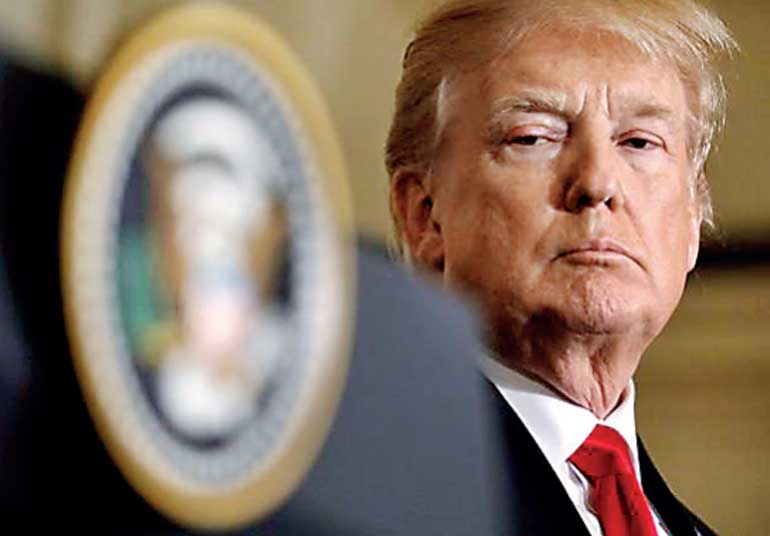Saturday Feb 21, 2026
Saturday Feb 21, 2026
Monday, 26 February 2018 00:00 - - {{hitsCtrl.values.hits}}
WASHINGTON/SEOUL (Reuters) - The United States said on Friday it was imposing its largest package of sanctions to pressure North Korea to give up its nuclear and missile programs, and President Donald Trump warned of a “phase two” that could be “very, very unfortunate for the world” if the steps did not work.
In addressing the Trump administration’s biggest national security challenge, the U.S. Treasury sanctioned one person, 27 companies and 28 ships, according to a statement on the U.S. Treasury Department’s website.

President Donald Trump
The United States also proposed a list of entities to be blacklisted under separate U.N. sanctions, a move “aimed at shutting down North Korea’s illicit maritime smuggling activities to obtain oil and sell coal.”
North Korea has been developing nuclear-tipped missiles capable of reaching the U.S. mainland and Trump and North Korean leader Kim Jong Un have exchanged taunts that have raised fears of war.
In August, Trump threatened to go beyond sanctions by bringing “fire and fury like the world has never seen,” although his administration has repeatedly said it prefers a diplomatic solution to the crisis.
Speaking at a news conference with Australian Prime Minister Malcolm Turnbull, Trump made apparent reference to military options his administration has repeatedly said remain on the table.
“If the sanctions don’t work, we’ll have to go phase two,” Trump said. “Phase two may be a very rough thing, may be very, very unfortunate for the world. But hopefully the sanctions will work.”
The sanctions’ targets include a Taiwan passport holder, as well as shipping and energy firms in mainland China, Hong Kong, Taiwan and Singapore. The actions block assets held by the firms and individuals in the United States and prohibit U.S. citizens from dealing with them.
The U.S. Treasury said the sanctions were designed to disrupt North Korean shipping and trading companies and vessels and further isolate Pyongyang. They are also aimed at ships located, registered or flagged in North Korea, China, Singapore, Taiwan, Hong Kong, Marshall Islands, Tanzania, Panama and the Comoros.
Last month, three Western European intelligence sources told Reuters that North Korea shipped coal to Russia last year and that it was then delivered to South Korea and Japan in a likely violation of U.N. sanctions.
Treasury Secretary Steve Mnuchin said the new sanctions would help prevent North Korea from skirting restrictions on trade in coal and other fuel through “evasive maritime activities.”
“The president is clearly frustrated and rightly so over the efforts that have failed in the past and also over the uptick in testing and the advances we’ve seen in the North Korean program,” a senior administration official told reporters.
At another briefing, Mnuchin stood next to enlarged photos he said showed December 2017 images that revealed ship-to-ship transfers of fuel and other products destined for North Korea in an attempt to evade sanctions.
He said he could not rule out the prospect of the United States boarding and inspecting North Korean ships.
Mnuchin said virtually all shipping currently being used by North Korea was now under sanction and the U.S. government had “issued an advisory alerting the public to the significant sanctions risks to those continuing to enable shipments of goods to and from North Korea.”
Mnuchin said the number of sanctions steps taken by the United States against Pyongyang since 2005 was now 450 with approximately half imposed in the last year.